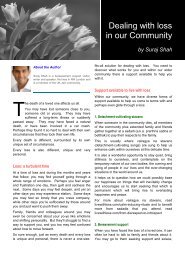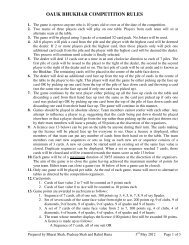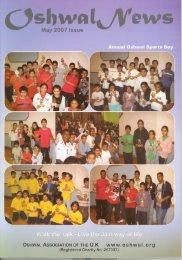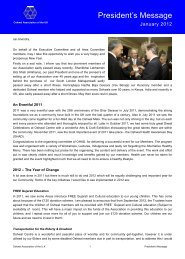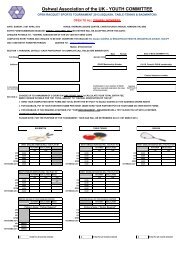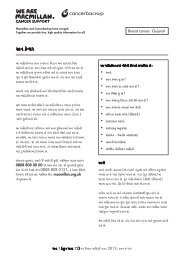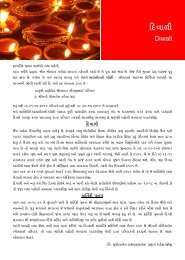Third Edition E-Magazine | April 2013 | www ... - Oshwal Centre
Third Edition E-Magazine | April 2013 | www ... - Oshwal Centre
Third Edition E-Magazine | April 2013 | www ... - Oshwal Centre
You also want an ePaper? Increase the reach of your titles
YUMPU automatically turns print PDFs into web optimized ePapers that Google loves.
~ Modern Food Ethics ~<br />
lower environmental footprint.<br />
TIP 6: Avoid air freighted foods.<br />
TIP 7: If, like me, you are unable to resist the urges to<br />
consume perishable exotic fruits like mango and papaya -<br />
try and go for the dried versions which can be shipped<br />
and thus are a lot less damaging for the environment.<br />
Palm oil products destroy rainforests…<br />
destruction. But I believe soya should be less of a<br />
concern for Jains in the West. Globally, the biggest<br />
producer of soya is the US. And a vast majority of soya is<br />
used to feed animals (including dairy cows), not humans.<br />
Moreover, soya is generally very clearly labelled as an<br />
ingredient, and in the UK it is easy to find soya products<br />
that have been produced in a sustainable, nondestructive<br />
way.<br />
TIP 8: Avoiding processed foods with a high saturated fat<br />
content is a healthy and easy way to avoid destructive<br />
palm oil products.<br />
TIP 9: Avoid animal products and highly processed foods<br />
containing soya. If you choose to consume soya, go for<br />
lightly processed products (e.g. soya milk, tofu) that are<br />
specifically labelled as being produced in a sustainable<br />
way.<br />
Palm oil is common ingredient in many processed foods.<br />
The oil is affordable, incredibly efficient to produce, and<br />
has many useful culinary and industrial properties.<br />
Unfortunately, palm oil is also associated with the<br />
destruction of primary rainforest in Malaysia and<br />
Indonesia – the habitat of Orang-utans.<br />
It is a big challenge to identify and avoid foods that<br />
contain palm oil. Most companies simply label palm oil as<br />
“vegetable oil” or “vegetable fat”. Some companies claim<br />
to use “sustainable palm oil”, but there is wide recognition<br />
among environmental groups that the certification<br />
process is deeply flawed. One helpful rule of thumb is to<br />
look at fat content. If “vegetable fat” is an ingredient, and<br />
the percentage of saturated fat (of total fat content) is<br />
higher than 30%, destructive palm oil is probably an<br />
ingredient.<br />
Soya is another food commonly associated with rainforest<br />
Waste less food…<br />
In the UK, we waste about 25% of the edible food that we<br />
buy, mainly because we buy too much! One of the<br />
easiest ways to reduce the himsa arising from our dietary<br />
choices is to simply reduce<br />
the amount of food that we<br />
waste.<br />
TIP 10: Some waste can be<br />
reduced by making more of<br />
the food we do eat (for<br />
example, eating bread crusts<br />
and fruit peel).<br />
TIP 11: Following a<br />
traditional Jain diet which<br />
involves lots of beans, lentils,<br />
pulses and grains is a great<br />
way to reduce food waste.<br />
These items can be bought<br />
<strong>Oshwal</strong> News E-magazine of the O.A.U.K. 11 <strong>April</strong> <strong>2013</strong> <strong>Edition</strong>





